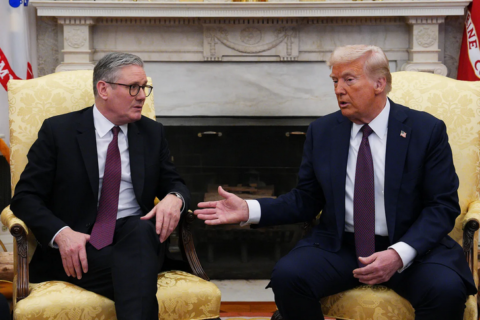On May 30th 1940, just after the war cabinet crisis & during the Dunkirk evacuation;
Winston Churchill was informed by the Canadian Prime Minister, Mackenzie King, of more dreadful news.
Roosevelt had no faith in Churchill nor Britain, and wanted Canada to give up on her.
Roosevelt thought that Britain would likely collapse, and Churchill could not be trusted to maintain her struggle.
Rather than appealing to Churchill’s pleas of aid — which were politically impossible then anyway — Roosevelt sought more drastic measures.
A delegation was summoned [from] Canada.
They requested Canada to pester Britain to have the Royal Navy sent across the Atlantic, before Britain’s seemingly-inevitable collapse.
Moreover, they wanted Canada to encourage the other British Dominions to get on board such a plan.
Mackenzie King was mortified. Writing in his diary,
“The United States was seeking to save itself at the expense of Britain. That it was an appeal to the selfishness of the Dominions at the expense of the British Isles. […] I instinctively revolted against such a thought. My reaction was that I would rather die than do aught to save ourselves or any part of this continent at the expense of Britain.”
On the 5th June 1940, Churchill wrote back to Mackenzie King,
“We must be careful not to let the Americans view too complacently prospect of a British collapse, out of which they would get the British Fleet and the guardianship of the British Empire, minus Great Britain. […]
Although President [Roosevelt] is our best friend, no practical help has been forthcoming from the United States as yet.”
Another example of the hell Churchill had to endure — which would have broken every lesser man.
Whilst the United States heroically came to aid Britain and her Empire, the initial relationship between the two great powers was different to what is commonly believed.
(The first key mover that swung Roosevelt into entrusting Churchill to continue the struggle — and as such aid would not be wasted on Britain — was when Churchill ordered the Royal Navy’s Force H to open fire and destroy the French Fleet at Mers-el-Kébir — after Admiral Gensoul had refused the very reasonable offers from Britain, despite Germany and Italy demanding the transference of the French Fleet as part of the armistices.)
Andreas Koreas, Twitter, 2024-12-27.
March 30, 2025
QotD: FDR, Mackenzie King and Churchill in 1940
March 29, 2025
Why India and Pakistan Hate Each Other – W2W 015 – 1947 Q3
TimeGhost History
Published 23 Mar 2025In 1947, the British divide the Raj into two nations, India and Pakistan, triggering one of the deadliest mass migrations in history. Sectarian violence between Hindus, Sikhs, and Muslims leaves at least 200,000 dead and displaces millions more. Hastily drawn borders turn neighbours into enemies. The partition’s bloody legacy will lead to decades of tension, war, and bloodshed.
(more…)
March 28, 2025
Mistaking popular fiction for real life
At Postcards from Barsoom, John Carter recounts an odd but revealing experience with a young progressive entity:
Some years ago I was provided a fascinating psychological experience in the form of a young graduate student in the English literature program, whom I encountered because they (you heard me) was (God that’s grammatically awkward) married to a colleague. She (I’m not doing this anymore) specialized in the study of propaganda, by which of course she meant everything her backwards conservative parents in Nowhere, Nebrahoma believed, and not anything she believed. One evening, after enthusiastically explaining the symbolism of the inverted pentagram tattooed on her shoulder, she informed me with invincible confidence that not only was gender an arbitrary social construction, but that even the idea of biological sex was nothing more than convention. Her reasoning, which I presume she’d gleaned from a seminar on radically liberatory queer theory, was that testosterone levels fluctuated during the day, so “males” changed their degree of “maleness” all the time, and how can something that’s constantly changing be used as the basis for a hard binary distinction?
“But that’s not how biological sex is defined,” I replied. “Testosterone is just a hormone. It’s only present in vertebrates. Insects don’t have it, and neither do plants, but they still have biological sex. Sex is defined according to whether an organism produces mobile gametes or sessile gametes, which is basically universal across multicellular life forms.”
“I don’t understand what that means,” she chirped, still thinking we were playing language games. “Like I don’t know what a ‘sessile gamete’ is.”
“Oh,” I responded helpfully, “A gamete is just a reproductive cell. Sessile means it doesn’t move. So –”
The horrible reality of what I was saying dawned upon her. “I just realized that this isn’t a conversation I should be having,” she cut me off, and walked away.
It was remarkable. The mindworm parasitizing her consciousness had detected a threat to its structural integrity, and ordered its host to remove herself from the interaction before she consumed a malinformative infohazard. She didn’t even pretend that this wasn’t what she was doing. I’d never before seen something quite like it.
There’s a long-standing joke that liberals don’t know things, that their entire worldview seems to be formed by the ersatz experiences of visual entertainment. When they discuss the war in Ukraine, they express it in terms of Marvel comic book movies or Star Wars; when thinking of President Trump, in terms of Harry Potter. Black people are all wise and benevolent and great dancers because this is what Fresh Prince and Morgan Freeman told them; white men are all inbred stupid Klansmen because of Mississippi Burning and Roots; girls are just as strong as boys (stronger, actually) because Black Widow kicks butt; and so on. Even their favourite point of historical reference – World War Two, the Nazis, Hitler – seems to be almost entirely a palimpsest of Steven Spielberg movies like Saving Private Ryan and Schindler’s List.
It isn’t just that they use fictional references as metaphors or allusions. That’s a very human thing to do, and the right is certainly no stranger to Tolkien analogies. But liberals seem to do this a lot, with only the most tenuous connection back to reality. Their inner world is a series of self-referential fantasies. The right uses fictional references as metaphors to explain facts; the left substitutes fictional metaphors for facts, and then forgets that it does this.
The recent Netflix drama Adolescence is a striking case in point. It portrays the fictional story of a 13-year-old white boy who stabs a female classmate to death because his brain was twisted into a pretzel by exposure to the incel subculture over social media. Following its premier, the British government has been using it to gin up a moral panic, with calls to censor social media to tackle the urgent problem of toxic masculinity.
March 24, 2025
The Concorde of the English Channel – Hoverspeed
Ruairidh MacVeigh
Published 23 Nov 2024Hello all!
In something a little different from cars, trains and planes, we take a look at what has often been considered the Concorde moment for cross-channel ferry operations, the introduction of routine hovercraft services between Britain and France by the Hoverlloyd and Seaspeed companies, and later the Hoverspeed firm following their merger.
Hoverspeed was a truly exceptional mixture of speed and technological prowess, skirting across the surface of the English Channel and reducing journey times to but a fraction of what they were aboard regular ferry boats, but due to increasing costs, a fragile business case, and the arrival of the Channel Tunnel, Hoverspeed, much like Concorde, is now but a fading memory of a bygone era for international travel.
Chapters:
0:00 – Preamble
0:44 – Rise of the Hovercraft
3:04 – Tapping an Untapped Market
7:15 – Into Service
10:33 – Heyday of the Hovercraft
13:05 – Fragile Foundations
17:21 – Coming to the End
21:55 – Conclusion
(more…)
March 21, 2025
QotD: Gordon Brown and the “Gillian Duffy affair”
The Gillian Duffy affair, the start of this People’s Decade, was fascinating on many levels. Fundamentally, it revealed the schism in values and language that separated the elites from ordinary people. To the professional middle classes who by that point — after 13 years of New Labour government — had conquered the Labour Party, people like Mrs Duffy were virtually an alien species, and places like Rochdale were almost another planet. Indeed, one small but striking thing that happened in the Duffy / Brown fallout was a correction published in the Guardian. One of that newspaper’s initial reports on the Duffy affair had said that Rochdale was “a few hundred miles” from London. Readers wrote in to point out that it is only 170 miles from London. To the chattering classes, it was clear that Rochdale was as faraway and as foreign as Italy or Germany. More so, in fact.
The linguistic chasm between Duffy and Brown spoke volumes about Labour’s turn away from its traditional working-class base. Yes, there was the word “bigot”, but, strikingly, that wasn’t the word that most offended Mrs Duffy. No, she was most horrified by Brown’s description of her as “that woman”. “The thing that upset me was the way he said ‘that woman'”, she said. “I come from the north and when you say ‘that woman’, it’s really not very nice. Why couldn’t he have just said ‘that lady’?”
One reason Brown probably didn’t say “lady” is because in the starched, aloof, technocratic world New Labour inhabited, and helped to create, the word “lady” had all but been banned as archaic and offensive in the early 2000s. Since the millennium, various public-sector bodies had made moves to prevent people from saying lady to refer to a woman. One college advised against using the word lady, as it is “no longer appropriate in the new century”. An NHS Trust instructed its workers that “lady” is “not universally accepted” and should thus be avoided. In saying “that woman”, Brown was unquestionably being dismissive — “that piece of trash” is what he really meant — but he was also speaking in the clipped, watchful, PC tones of an elite that might have only been 170 miles from Rochdale (take note, Guardian) but which was in another world entirely in terms of values, outlook, culture and language.
“I’m not ‘that woman'”, said Duffy, and in many ways this became the rebellious cry of the People’s Decade. She was pushing back against the elite’s denigration of her. Against its denigration of her identity (as a lady), of her right to express herself publicly (“it’s just ridiculous”, as Brown said of that very public encounter), and most importantly of her concerns, in particular on the issue of immigration and its relationship to the welfare state.
The Brown-Duffy stand-off at the start of the People’s Decade exposed the colossal clash of values that existed between the new political oligarchy represented by Brown, Blair and other New Labour / New Conservative machine politicians and the working-class heartlands of the country. To Duffy and millions of other people, the relationship between welfare and nationhood was of critical importance. That is fundamentally what she collared Brown about. There are “too many people now who are not vulnerable but they can claim [welfare]”, she said, before asking about immigration. Her suggestion, her focus on the issue of health, education and welfare and the question of who has access to these things and why, was a statement about citizenship, and about the role of welfare as a benefit of citizenship. But to Brown, as to virtually the entire political class, it was just bigotry. Concern about community, nationhood and the impact of immigration is just xenophobic Little Englandism in the minds of the new elites. This was the key achievement of 13 years of New Labour’s censorious, technocratic and highly middle-class rule — the reduction of fealty to the nation to a species of bigotry.
Brendan O’Neill, “The People’s Decade”, Spiked, 2019-12-27.
March 20, 2025
The REAL Cause of the Revolutionary War
Atun-Shei Films
Published 15 Mar 2025What caused the American Revolution? Let’s dive beneath the surface-level understanding of British tyranny and unjust taxation and try to understand the long-term social, political, and economic forces which set the stage for our War of Independence.
00:00 Introduction
03:00 1. The World Turned Upside Down
13:50 2. The Paradox of American Liberalism
28:34 3. The Rage Militaire
38:12 Conclusion / Credits
(more…)
March 17, 2025
My Big Fat Greek Civil War – W2W 12 – 1947 Q2
TimeGhost History
Published 16 Mar 2025As Europe emerges from WWII, Greece plunges into chaos. Political polarization, revenge killings, and failed diplomacy ignite a bitter civil war, turning former allies into deadly foes. From communist partisans regrouping in the mountains, to royalists asserting brutal dominance, the battle lines are drawn. Could Greece become the first major flashpoint in the Cold War, threatening peace across the Balkans and beyond?
(more…)
March 16, 2025
QotD: The “Social Contract”
… that’s a problem for modern political science, because — put briefly but not unfairly — all modern political science rests on the idea of the Social Contract, which is false. And not just contingently false, either — it didn’t get overtaken by events or anything like that. It’s false ab initio, because it rests on false premises. It seemed true enough — true enough to serve as the basis of what was once the least-worst government in the history of the human race — but the truth is great and shall prevail a bit, as I think the old saying goes.
Hobbes didn’t actually use the phrase “social contract” in Leviathan, but that’s where his famous “state of nature” argument ends. In the state of nature, Hobbes says, the only “law” is self defense. Every man hath the right to every thing, because nothing is off limits when it comes to self preservation; thus disputes can only be adjudicated by force. And this state of nature will prevail indefinitely, Hobbes says, because even though some men are stronger than others, and some are quicker, cleverer, etc. than others, chance is what it is, and everybody has to sleep sometime — in other words, no man is so secure in so many advantages that he can impose his will on all possible rivals, all the time. We won’t be dragged out of the state of nature by a strongman.
The only way out of the state of nature, Hobbes argues, is for all of us, collectively, to lay down at least some of our rights to a corporate person, the so-called “Leviathan”, who then enforces those rights for us. So far, so familiar, I’m sure, but even if you got all this in a civics class in high school (for the real old fogeys) or a Western Civ class in college (for the rest of us), they probably didn’t go over a few important caveats, to wit:
The phrase corporate person means something very different from what even intelligent modern people think it does, to say nothing of douchebag Leftists. In the highly Latinate English of Hobbes’s day, “to incorporate” meant “to make into a body”, and they used it literally. In Hobbes’s day, you could say that God “incorporated” (or simply “corporated”) Adam from the dust, and nobody would bat an eye. I honestly have no idea what Leftists think the term “corporate person” means — and to be fair, I guess, they seem to have no idea either — but for us, we hear “corporation” and we think in terms of business concerns. Which means we tend to attribute to Hobbes the view that the Leviathan, the corporate person, is an actual flesh and blood person — specifically, the reigning monarch.
That’s wrong. Hobbes was quite clear that the Leviathan could be a senate or something. He thought that was a bad idea, of course — the historical development of English isn’t the only reason we think Hobbes means “the person of the king” when he writes about the Leviathan — but it could be. So long as it’s the ultimate authority, it’s the Leviathan. For convenience, let’s call it “the Leviathan State”, although I hope it’s obvious why Hobbes would consider that redundant.
Second caveat, and the main reason (I suppose) it never occurred to Hobbes to call it a social contract: It can’t be broken. By anyone. Ever. It can be overtaken by events (third caveat, below), but no one can opt out on his own authority. The reason for this is simple: If you don’t permanently lay down your right to self defense (except in limited, Rittenhouse-esque situations that aren’t germane here), then what’s the point? A contract that can be broken at any time, just because you feel like it, is no contract at all. And consider the logical consequences of doing that, from the standpoint of Hobbes’s initial argument: If one of us reverts to the state of nature, then we all do, and the war of all against all begins again.
Third caveat: The Leviathan can be defeated. Hobbes considers international relations a version of the state of nature, one there’s no getting out of. If pressed, he’d probably try to attribute Charles I’s defeat in the English Civil War to outside causes. Indeed at one point he comes perilously close to arguing something very like that New Donatist / “Mandate of Heaven” thing we discussed below, but however it happened, it is unquestionably the case that Charles I’s government is no more. Hobbes bowed to reality — he saw that Parliament actually held the power in England, whatever the theoretical rights and wrongs of it, so even though the physical person of Charles II was there with him in Paris, Hobbes took the Engagement and sailed home.
Severian, “True Conclusions from False Premises”, Founding Questions, 2021-11-22.
March 9, 2025
Italy’s Italian Fiasco
World War Two
Published 8 Mar 2025Today Sebastian puts Indy and Sparty in the hot seat for questions about the war in China and North Africa. Just what is the deal with the Italian Army anyway? How much fighting did the CCP do against the Japanese? And what’s the most overlooked event of the first year of war?
(more…)
QotD: HR metastasized
There are really only three management books anyone ever needs to read (soon forthcoming, the fourth, my own precis of those three!) and we can use all of them in explaining this.
The Peter Principle tells us that everyone gets promoted to their own level of incompetence. So, that explains why the people actually running HR departments are incompetent. The second is Parkinson’s Law, which everyone usually takes to be about work expanding to fill the time available etc. In reality the book as a whole is about how bureaucracy will eat an organisation from the inside. Like one of those parasitic wasps where the pupae eat the spider from the inside out. The lesson of this is that proper management of any organisation is a constant battle against the growth of the bureaucracy. Proper managers should — must — spend significant amounts of their time turning a blowtorch on that internal bureaucracy. Real slash and burn, proper Carthaginian Solution on their arses.
The third has the most direct and exact relevance here. Up the Organisation. In which we are told that the personnel department (what we had before Human Resources) should be the secretary of the line manager. Someone wants to hire someone? Sure. The person who decides who to hire is the person doing the hiring. He needs an assistant only in so far as someone should phone up the local rag to put the job ad in.
Now, it is necessary to have someone making sure the details for the paycheque are right, that they enrolled in the company equity scheme, health care is sorted. But that’s some beancounter preferably hundreds of miles away from any actual influence upon anything.
All of which — from that distillation of the finest ponderings upon corporate management civilisation has so far achieved — tells us what to do with Human Resources.
Turn the blowtorches on the power skirts. Possibly even the full Carthaginian. Tho’ who we’ll find to buy as drabs and doxies the usual inhabitants of HR is another matter. Dunno, might be worth ploughing them into the fields and selling the salt instead.
Tim Worstall, “The Invasion Of The Power Skirts”, It’s all obvious or trivial except …, 2024-12-06.
March 6, 2025
Passionate belief in historical untruths
As mentioned in earlier posts, one of the most toxic exports from Australia to the rest of the Anglosphere has been the academic indulgence in believing that “settler colonialism” explains everything about the history of Canada, Australia, New Zealand and anywhere else the British diaspora touched:
Throughout the English-speaking world elites are falling over themselves to believe the very worst of their own countries.
In Britain, the Church of England has committed itself to spend an initial £100 million on slavery-reparations in response to the discovery that its endowment had “links” with African enslavement. “The immense wealth accrued by the Church … has always been interwoven with the history of African chattel enslavement”, a document explains. “African chattel enslavement was central to the growth of the British economy of the 18th and 19th centuries and the nation’s wealth thereafter”. And this has “continuing toxic consequences”.
Yet almost none of this is true. The evidence shows that the Church’s endowment fund was hardly involved in the evil of slave-trading at all. Most economic historians reckon the contribution of slave-trading and slavery to Britain’s economic development as somewhere between marginal and modest. And between abolition in 1834 and the present, multiple causes have intervened to diminish slavery’s effects.
Consonant with his church’s policy, the (then) Archbishop of Canterbury, Justin Welby preached a sermon in Christ Church Cathedral, Zanzibar last year, in which he criticised Christian missionaries for treating Africans as inferior and confessed that “we [British] must repent and look at what we did in Zanzibar”.
Really? What the British did in Zanzibar during the second half of the 19th century was to force the Sultan to end the slave-trade. Indeed, the cathedral in which the archbishop was preaching was built over the former slave-market. And here’s what the pioneering missionary David Livingstone wrote about black Africans in 1871: “I have no prejudice against [the Africans’] colour; indeed, anyone who lives long among them forgets they are black and feels that they are just fellow men…. If a comparison were instituted, … I should like to take my place among [them], on the principle of preferring the company of my betters”.
[…]
St. John Baptiste church was one of many local churches to go up in flames during Justin Trudeau’s performative national guilt trip over “unmarked mass graves” at former Residential Schools across Canada.
Which bring us to Canada. The May 2021 claim by a Kamloops Indian band to have discovered the remains of 215 “missing children” of an Indian Residential School was quickly sexed up by the media into a story ‘mass graves’, with all its connotation of murderous atrocity. The Toronto Globe and Mail published an article under the title, “The discovery of a mass gravesite at a former residential school in Kamloops is just the tip of the iceberg”, in which a professor of law at UBC wrote: “It is horrific … a too-common unearthing of the legacy, and enduring reality, of colonialism in Canada”. Prime Minister Justin Trudeau ordered Canadian flags to be flown at half-mast on all federal buildings to honour the murdered children. Because the Kamloops school had been run by Roman Catholics, some zealous citizens took to burning and vandalising churches, 112 of them to date. The dreadful tale was eagerly broadcast worldwide by Al Jazeera.
Yet, four years later, not a single set of remains of a murdered Indian child in an unmarked grave has been found anywhere in Canada. Judging by the evidence collected by Chris Champion and Tom Flanagan in their best-selling 2023 book, Grave Error: How the Media Misled us (and the Truth about the Residential Schools), it looks increasingly probable that the whole, incendiary story is a myth.
So, prime ministers, archbishops, academics, editors, and public broadcasters are all in the business of exaggerating the colonial sins of their own countries against noble (not-so-very) savages — from London to Sydney to Toronto. Why?
The Iron Curtain Descends – W2W 10 – News of 1946
TimeGhost History
Published 5 Mar 20251946 sees the world teetering on the brink of a new global conflict. George Kennan’s long telegram outlines Moscow’s fanatical drive against the capitalist West, while our panel covers escalating espionage, strategic disputes over Turkey, and the emerging ideological battle between the U.S. and the USSR. Tune in as we break down the news shaping the dawn of the Cold War.
(more…)
HMCS Bonaventure – The Pride of Canada’s Fleet
Skynea History
Published 22 Oct 2024For today’s video, we’ll be looking at the last of Canada’s aircraft carriers. Not typically a navy you associate with that kind of ship, but the Canadians actually operated three during the Cold War.
The third, HMCS Bonaventure, is an interesting one. A small ship, that operated aircraft at the very edge of her capability. And routinely baffled American pilots in the process.
Yet, she was also a ship that came to an end before her time. Decommissioned and scrapped, right after an expensive (and extensive) mid-life overhaul. In what is generally seen as a bad political move, more than anything to do with her capabilities.
(more…)
QotD: Old Etonians
If you’d told somebody in the mid 2000s that David Cameron would become Prime Minister, they would have laughed in your face. If you then told them that a few years later Boris Johnson would be one of his successors, they’d consider you bonkers. This was Blairite Britain – gone were the days of Macmillan, Douglas-Home, and the coterie of other prime ministers educated at that same dusty institution – the hegemony of the Old Etonian was firmly over. Yet Cameron became the 19th Prime Minister educated there, and Boris the 20th, making five out of the fourteen prime ministers elected during Queen Elizabeth II’s reign Old Etonians.
When I first started there, the traditions seemed daunting, and while you had a week of grace period to find your feet, it took a lot longer for the novelty truly to wear off. Dressed in a tailsuit that makes you look like a penguin, and that even the production team of Downton Abbey would question, it’s a complete culture shock. Teachers become “beaks”; homework becomes “EW (short for Extra Work)”, and the threat of “tardy book” (a punishment where you have to get up early to report to the School Office) is ever present. Your life is governed by a tutor, housemaster, and dame (a surrogate mother for your time there, and the most influential person in your day-to-day life), and outside of lessons (known as “schools”) you’re left to your own devices. It’s a sink or swim situation, and some can’t hack the overload of independence.
You’re constantly surrounded by things named after great men who have come before you – whether that be John Maynard Keynes (an economics society) or William Gladstone (a library) – and you can’t help but see yourself as heir to some great dynasty. Sitting in Upper School – a large schoolroom now mainly used for talks by visiting speakers – the walls are lined with marble busts of illustrious Old Etonians past, and it’s not hard to daydream about joining them. In our first ever assembly the head master put it best: “If you know that some interesting people have gone on to do some interesting things, whether it’s George Orwell or the Duke of Wellington, that does implicitly ask the question, why not you?” Success never seems far away, and often you’re regaled with tales about the time your beak caught a famous actor smoking, or how awful a pupil a noted academic once was. Neither does service, particularly when you pass the memorial boards for the First World War (as you do daily on the way to chapel): 1157 Old Etonians died, and 37 Old Etonians have won the Victoria Cross – 17 more than any other school.
In your final years, it’s fun to try and work out who’s going to be most successful after leaving, and – it never seems too outlandish – who among you could be a future prime minister. The people you consider are never confined to a particular group – it’s not “one of the debaters” or “one of the Rugby XV” – in fact, it’s often those who you can’t seem to categorize, or transverse the groups that are most magnetic. To get into Eton, you have to do well in the infamous “List Test”, composed of a computerized assessment and an interview with one of the beaks. For an eleven year old, it can be brutal (one boy left crying midway through our test), particularly as you don’t know what they want: they’re not looking for candidates that fit a particular box. Potential is valued more than current ability, and the greatest asset is that of being interesting. With only one in five getting an offer (odds stiffer than Oxbridge), and after five years of being expected to perform at the highest level, it’s unsurprising that students end up so successful.
Ivo Delingpole, “Boris and the Spirit of Eton”, Die Weltwoche, 2020-01-29.











